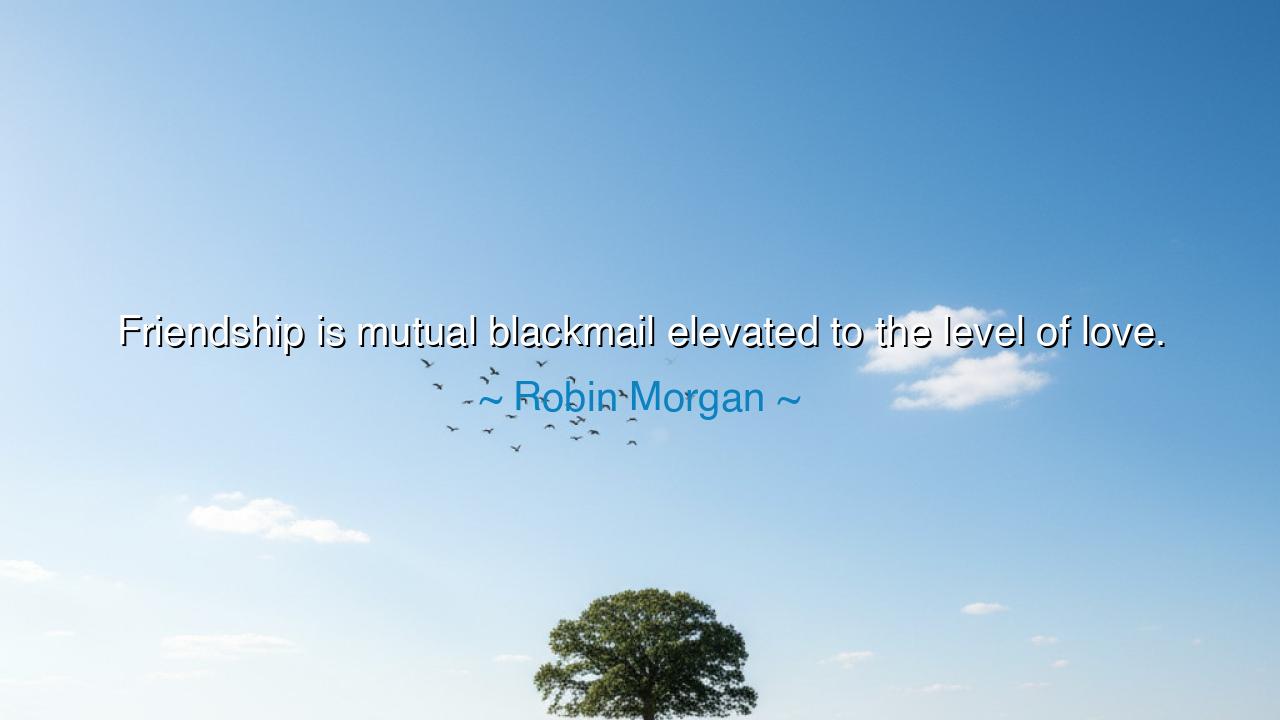
Friendship is mutual blackmail elevated to the level of love.






Hearken, O seeker of wisdom, to the words of Robin Morgan, who once cast a mirror upon the curious nature of human bonds: “Friendship is mutual blackmail elevated to the level of love.” At first glance, these words may strike the ear as irreverent, almost cruel, yet within their jest lies a profound truth about the fragile power and intimate responsibility that friendship entails. Consider that every friendship, whether forged in childhood or tempered by the fires of adversity, carries with it the weight of shared vulnerability, the silent ledger of secrets and expectations. It is in this delicate balance that the essence of friendship reveals itself: a dance of trust, obligation, and sometimes, unspoken coercion, lifted by the wings of love into a bond both sacred and enduring.
In the ancient times, the philosophers and storytellers alike observed this human duality. Plato spoke of friendship as the meeting of souls, yet he acknowledged that even in such noble union, there exists a subtle tug of influence, a power that each friend holds over the other. Robin Morgan’s modern quip mirrors this ancient wisdom, for to be a true friend is to possess knowledge that could harm, yet to choose restraint, to wield one another’s truths not as weapons but as instruments of care. This is mutual blackmail in its loftiest form—not the craven exchange of threats, but the quiet, binding recognition of each other’s weaknesses and the courage to honor them.
Let us contemplate a historical example, luminous in its clarity: the bond between John Adams and Thomas Jefferson, two titans of a fledgling republic. Their friendship endured rivalry, ideological clashes, and years of silence, yet even amid the fiercest political storms, they held each other’s secrets and convictions with care. Each could, at any time, exploit knowledge of the other’s fears or failures, yet they chose elevation—their mutual regard, their letters full of candid affection, turning potential blackmail into lasting loyalty and love. Through this lens, Morgan’s words are not a jest but a revelation: friendship is the recognition of power and vulnerability, transfigured by respect and love.
Oftentimes, the mutual blackmail of friendship manifests in the most tender forms: a friend reminding another of past follies to teach humility, a confidant holding the mirror of truth even when it wounds, or a companion silently bearing witness to one’s shame. These acts are subtle, sometimes imperceptible, yet they forge the alchemy that converts ordinary camaraderie into enduring devotion. It is love that elevates these exchanges beyond mere manipulation, transforming the ledger of secrets into a testament of intimacy and loyalty.
Consider, too, the realm of the arts, where the friendships of poets and painters have often mirrored Morgan’s paradox. The letters exchanged between Vincent van Gogh and his brother Theo reveal a friendship that could easily have collapsed under the weight of mental anguish and financial despair. Each held a delicate power over the other—the knowledge of weakness, the capacity to judge or despair—but through constancy and devotion, they lifted their bond into a higher plane. Theirs was friendship transfigured, a form of mutual blackmail ennobled by love, sustaining the spirit amid suffering.
In practical life, the lesson resounds as both a warning and an inspiration. True friendship requires courage: the courage to trust, the courage to confront, and the courage to bear responsibility for the other’s vulnerability. It is neither casual nor trivial; it is a sacred contract written not in ink but in shared experience, in secrets held and in hearts entrusted. To understand Morgan’s words is to perceive the gravity of the gift of friendship: it is a power to shape and support, a force that can either wound or heal, depending on the wisdom with which it is wielded.
Hence, let us walk deliberately in the cultivation of friendship. Practical actions arise naturally: first, cherish honesty, revealing and acknowledging the truths that bind you; second, honor boundaries, respecting the sacred vulnerabilities of others; third, lift each other in moments of trial, transforming potential leverage into compassion; and fourth, nurture the shared joys that soften the weight of mutual obligations. In doing so, the mundane ledger of human interactions is alchemized into a treasure of enduring love.
In the final reckoning, Robin Morgan’s witticism is no mere jest but a revelation: friendship is power made tender, knowledge made faithful, blackmail transformed by love into a force that sustains the human spirit. Let us treat it as such, with reverence, courage, and unwavering care, that the bonds we forge may endure beyond the fleeting shadows of fear, ego, and folly, shining instead as monuments to the greatness of the human heart.
If you wish, I can also condense this into a highly rhythmic audio narration script, emphasizing the rise and fall of emotional cadence, so it flows like a spoken teaching for storytelling or podcast use. Would you like me to do that?






AAdministratorAdministrator
Welcome, honored guests. Please leave a comment, we will respond soon